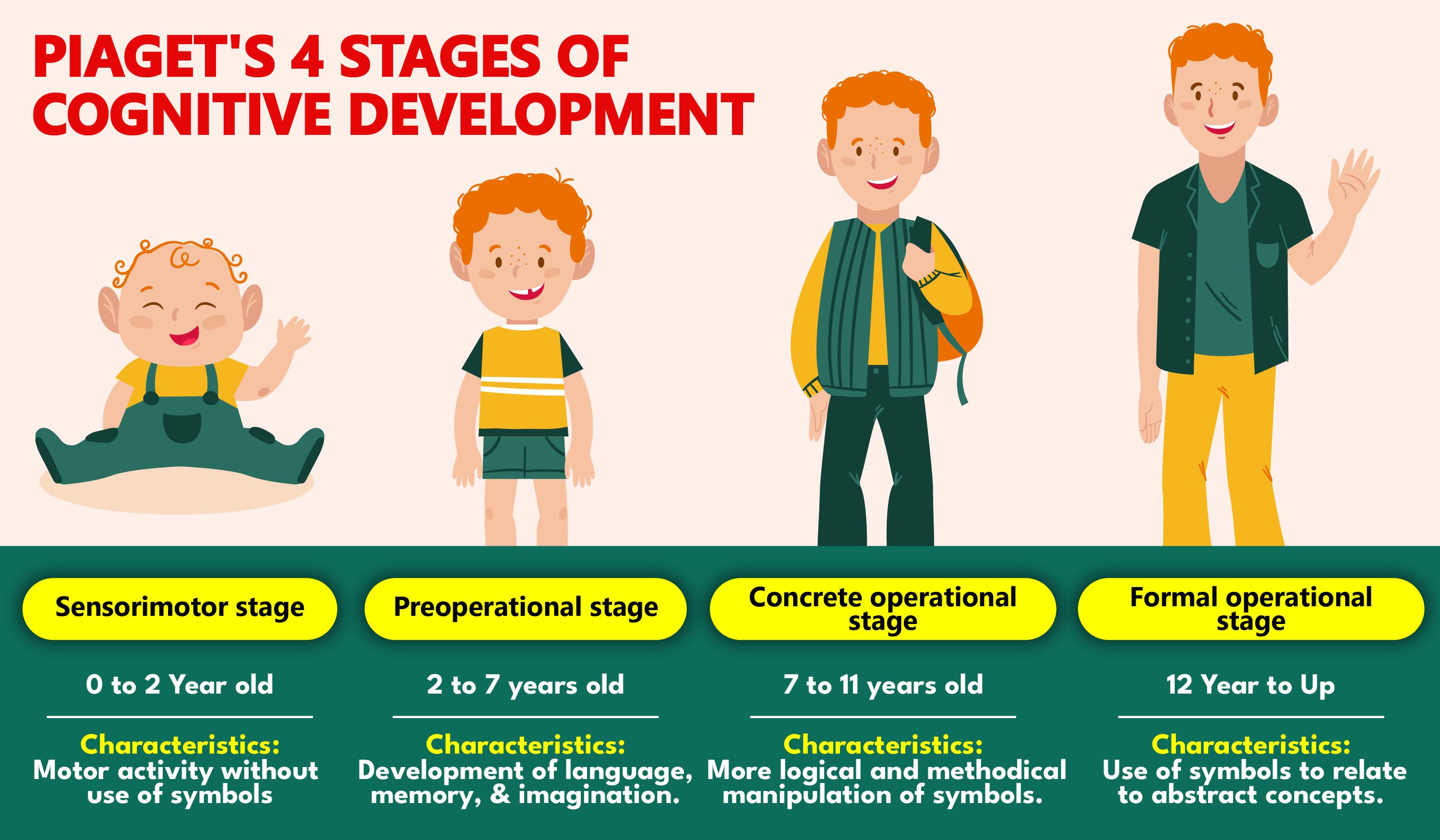Table of Contents
Jean Piaget, a Swiss developmental psychologist, proposed a theory that children progress through four distinct stages of cognitive development. This theory emphasizes the active role children play in constructing their understanding of the world. Piaget’s theory of cognitive development proposes that children actively build their understanding of the world through stages.
Infants learn through senses and actions (sensorimotor), then progress to using symbols and pretend play (preoperational). Later, they can think logically with concrete objects (concrete operational), before finally developing abstract reasoning and hypothetical thinking (formal operational). This theory highlights how children are constantly constructing and adapting their mental models of the world.
Piaget’s 4 Stages of Cognitive Development
Below is a table summarizing the key features of each stage of Piaget’s theory of cognitive development:
| Stage | Age Range | Key Features |
|---|---|---|
| Sensorimotor | Birth to 2 years | – Learn through senses and actions, Object permanence develops, Lack of symbolic thought |
| Preoperational | 2 to 7 years | – Use of language and symbols, Egocentrism, Lack of conservation |
| Concrete Operational | 7 to 11 years | – Logical thinking with concrete objects, Understanding of conservation and reversibility |
| Formal Operational | 12 years and older | – Abstract thinking and hypothetical reasoning, Logical problem-solving |
Sensorimotor Stage (Birth to 2 years)
The Sensorimotor stage lays the foundation for later cognitive development by fostering sensory exploration, motor skills, and the understanding of fundamental concepts like object permanence.
- Age Range: Birth to 2 years
- Key Characteristics:
- Sensory Exploration: Infants learn about the world primarily through their senses, including sight, hearing, touch, taste, and smell.
- Motor Development: Motor skills develop rapidly during this stage, progressing from reflexive movements to intentional actions.
- Object Permanence: Gradually, infants begin to understand that objects continue to exist even when they are out of sight, a concept known as object permanence.
- Trial-and-Error Learning: Infants engage in trial-and-error exploration, manipulating objects to understand their properties and functions.
- Symbolic Representations: Towards the end of the stage, infants may begin to use rudimentary symbols, such as gestures or sounds, to represent objects or actions.
- Educational Implications:
- Early childhood educators should provide infants with a variety of sensory-rich experiences to promote cognitive development.
- Toys and activities that encourage exploration, such as rattles, textured objects, and simple puzzles, are beneficial during this stage.
Preoperational Stage (2 to 7 years)
The Preoperational stage marks significant advancements in language and symbolic thinking, laying the groundwork for more complex cognitive abilities in later stages.
- Age Range: 2 to 7 years
- Key Characteristics:
- Symbolic Thinking: Children begin to use language, images, and symbols to represent objects and ideas, enabling imaginative play and communication.
- Egocentrism: Children struggle to perceive situations from perspectives other than their own, often leading to misunderstandings and conflicts.
- Centration: They tend to focus on one aspect of a situation while neglecting others, making it difficult for them to understand conservation principles.
- Lack of Reversibility: Children have difficulty understanding that actions can be reversed, leading to challenges in mental operations.
- Educational Implications:
- Early childhood educators should incorporate activities that promote symbolic thinking, such as storytelling, role-playing, and drawing.
- Concrete examples and hands-on experiences are essential for helping children understand abstract concepts.
Concrete Operational Stage (7 to 11 years)
The Concrete Operational stage represents a crucial period of cognitive development where children refine their logical thinking skills and gain a deeper understanding of the physical world around them.
- Age Range: 7 to 11 years
- Key Characteristics:
- Concrete Thinking: Children can think logically about concrete objects and events but struggle with abstract or hypothetical situations.
- Conservation: They begin to understand that quantity remains the same even when the shape or arrangement of objects changes, demonstrating conservation skills.
- Decentration: Children become less egocentric and can consider multiple aspects of a problem simultaneously, facilitating more effective problem-solving.
- Reversibility: They grasp the concept of reversibility, understanding that actions can be undone or reversed.
- Educational Implications:
- Educators should design activities that promote classification, seriation, and conservation skills, such as sorting games and measurement tasks.
- Providing real-life examples and encouraging students to apply logical reasoning to everyday situations enhances learning outcomes.
Formal Operational Stage (12 years and older)
The Formal Operational stage represents the pinnacle of cognitive development, enabling individuals to engage in sophisticated reasoning, exploration of abstract concepts, and personal identity formation. It equips them with the intellectual tools necessary for academic success, scientific inquiry, and navigating the complexities of adult life.
- Age Range: 12 years and older
- Key Characteristics:
- Abstract Thinking: Individuals can think abstractly and hypothetically, considering possibilities beyond concrete experiences.
- Hypothetical-Deductive Reasoning: They can systematically generate and test hypotheses to solve problems, utilizing logical and deductive reasoning.
- Metacognition: Individuals develop metacognitive abilities, including self-awareness and reflection on their own thoughts and reasoning processes.
- Idealistic Thinking: Idealism and idealistic thinking emerge, leading individuals to contemplate complex moral, philosophical, and existential questions.
- Educational Implications:
- Educators should design curriculum and learning experiences that stimulate abstract thinking, problem-solving, and metacognitive skills development.
- Promoting inquiry-based learning, debates, and research projects fosters intellectual curiosity and prepares students for higher education and professional endeavors.
Download Piaget Theory PDF
The direct link to download the Piaget Theory PDF has been provided below. Candidate must click on the below link to download the Piaget’s 4 Stages of Cognitive Development, Detailed Explanation PDF for Exam preparation.



 UGC NET Study Notes for Paper 1, Downloa...
UGC NET Study Notes for Paper 1, Downloa...
 ICT and Governance, Download PDF for UGC...
ICT and Governance, Download PDF for UGC...
 Climate Change and its Socio-economic an...
Climate Change and its Socio-economic an...









